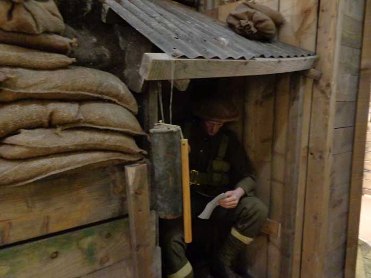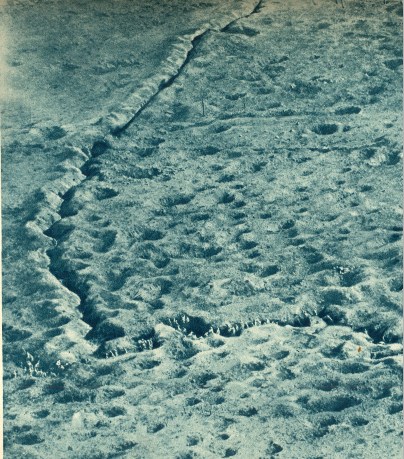Cumberland Council has now replaced the previous Cumbria County Council and 3 District Councils. The content on this website is still relevant including documents that may include the old county council logo. Find out about the council changes
Please update any cumbria.gov.uk browser shortcuts you may have to the new site pages as needed
Western Front


A Wartime Song From the Trenches
By Joseph Ritson
Did the First World War soldiers really spend much of their time in the front line trenches writing letters and poetry? Did they really sing songs marching to and from the trenches?
The answer is 'yes' and the evidence can be found in the wartime issues of local Cumbrian newspapers. Throughout the war the local newspapers printed copies of letters written by frontline soldiers to family and friends back home. Most weeks the newspapers published poems about the war and stories of fund raising concerts and recitals in village halls throughout the county. If it was in the local paper then it really happened!
In May 1915 'The Whitehaven News' printed a letter by Private Thomas Savage, 4577, 2nd Battalion Border Regiment of Whitehaven to Mr Alex Miller, the manager of Walkmill Colliery, Moresby. Private Savage had worked as a miner at Walkmill before the war. His letter tells of his pride of serving with a gallant battalion and how hot it was in France at the time. He has also written the words of a song the men of 2nd Border would sing while marching to and from the trenches, sung to the tune of 'My Little Grey Home in the West', a popular song of the time.
This is the song the 2nd Borderers used to sing in France in 1915:
My Little Wet Home in the Trench
I have a little wet home in the trench,
Where the rainstorms continually drench.
There's a dead cow close by
With her feet to the sky,
And she gives off a beautiful stench.
Underneath in a place of wet mud and some straw;
And Jack Johnsons tear
Through the rain sodden air
To my little wet home in the trench.
There are snipers who keep on the go,
So you must keep your napper down low.
They the star shells at night
Make a deuce of a light,
Which causes the language to flow.
Then bully and biscuits we chew,
For it's days since we tasted a stew.
But with shells bursting there,
There's no place to compare
With my little wet home in the trench.
Private Thomas Savage of the 2nd Borders was my grandmother's brother. He died on 1 December 1918 at the age of 22.
First Day of the Battle of the Somme 1st July 1916
The Germans had been assaulting the French at Verdun for 5 months when the Allied commanders decided on an operation to relieve the French. The operation was to push the Germans back and get them to sue for peace by Christmas of that year. Bombardment of the German lines had begun on the 24th June with a full attack to start on the 29th June. This was put off due to bad weather and the whistles blew to go over the top at 7:30 on the morning of July 1st 1916. 100,000 British soldiers advanced at a walking pace across no man's land only to find the German lines intact. By the end of the day, the British had suffered 57,470 casualties of which 19,240 were deaths, the heaviest suffered by a British force in one day.
With the outbreak of the war, Lord Kitchener had promised that those that had enlisted together could fight together. Lord Lonsdale decided to recruit men from Cumberland and Westmorland to form a 'Pals' Battalion of the Border Regiment. He designed their uniform and paid for their equipment with his own money and named them after himself, the Lonsdale Battalion (11th Border Regiment). They were trained under Colonel Machell at Blackhall Racecourse, Carlisle.
The Lonsdales arrived in France during November 1915 where they were given further training and some experience in the trenches. Their first action in a major operation was at the Battle of the Somme which began on July 1st 1916. They went over the top at 8:00am. On leaving their trenches in the wood, even before arriving at the front British trench, the Battalion came under terrific machine-gun fire. Within the first few minutes they were leaderless after the death of Colonel Machell, shot through the head urging his men forward. His adjutant, Lieutenant Gordon, was severely wounded as he attended Machell. The second in command was already wounded and out of action. There was no question of flinching but the terrible toll taken by the machine guns meant that few Lonsdales reached the German trenches. Out of the 28 Officers and 800 men that began the advance, only 5 officers and 300 men survived to answer the evening roll call; the rest were killed or wounded. The Battalion history recorded 'Men could do no more'. Many are buried in the Lonsdale Cemetery at Authuille, a village 5 kilometres north of the town of Albert. Mrs Davidson of 11 Grosvenor Gardens, Carlisle wrote to her son on the 10th July 1916 'Mr Gate wrote and told his wife that Carlisle people would get a dreadful shock when the Casualty list comes out. It all happened in about one hour between 7:30 and 8:30 on July 1st. Mrs Wilson is hoping no news is good news but people say not in this case.'
The Lonsdales were later relieved on the 3rd and 4th July. After training with the new recruits and more trench duty, they returned to action on 18th November at Engelbelmer.

